LW308 - Fiji Constitutional Law: Analysis of Evidentiary Issues
VerifiedAdded on 2023/06/14
|16
|3860
|286
Report
AI Summary
This paper critically analyzes several constitutional and evidentiary issues within the Fiji legal system. It examines the right to a fair hearing, presumption of innocence, and right to counsel as enshrined in the Fiji Constitution, highlighting instances where these rights were potentially violated in a specific case. The paper further delves into the admissibility of evidence, focusing on hearsay and real evidence, and discusses the legal framework for granting bail. It also addresses the requirements for a successful claim of malicious prosecution, emphasizing the need to prove lack of reasonable cause and malicious intent. The document is a valuable resource for students studying constitutional law, offering a detailed analysis of key legal principles and their practical application within the Fiji context. Desklib provides similar solved assignments and resources for students.
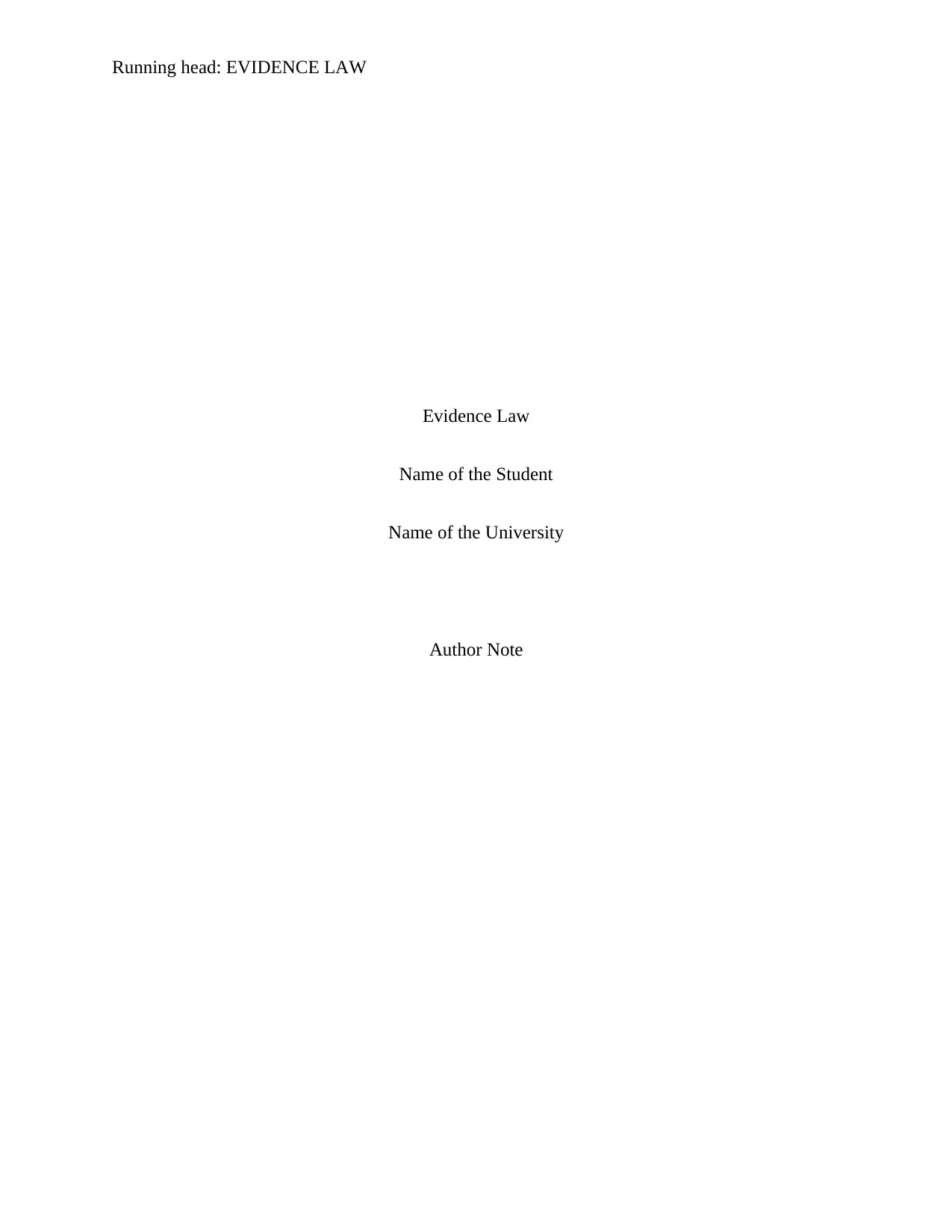
Running head: EVIDENCE LAW
Evidence Law
Name of the Student
Name of the University
Author Note
Evidence Law
Name of the Student
Name of the University
Author Note
Paraphrase This Document
Need a fresh take? Get an instant paraphrase of this document with our AI Paraphraser
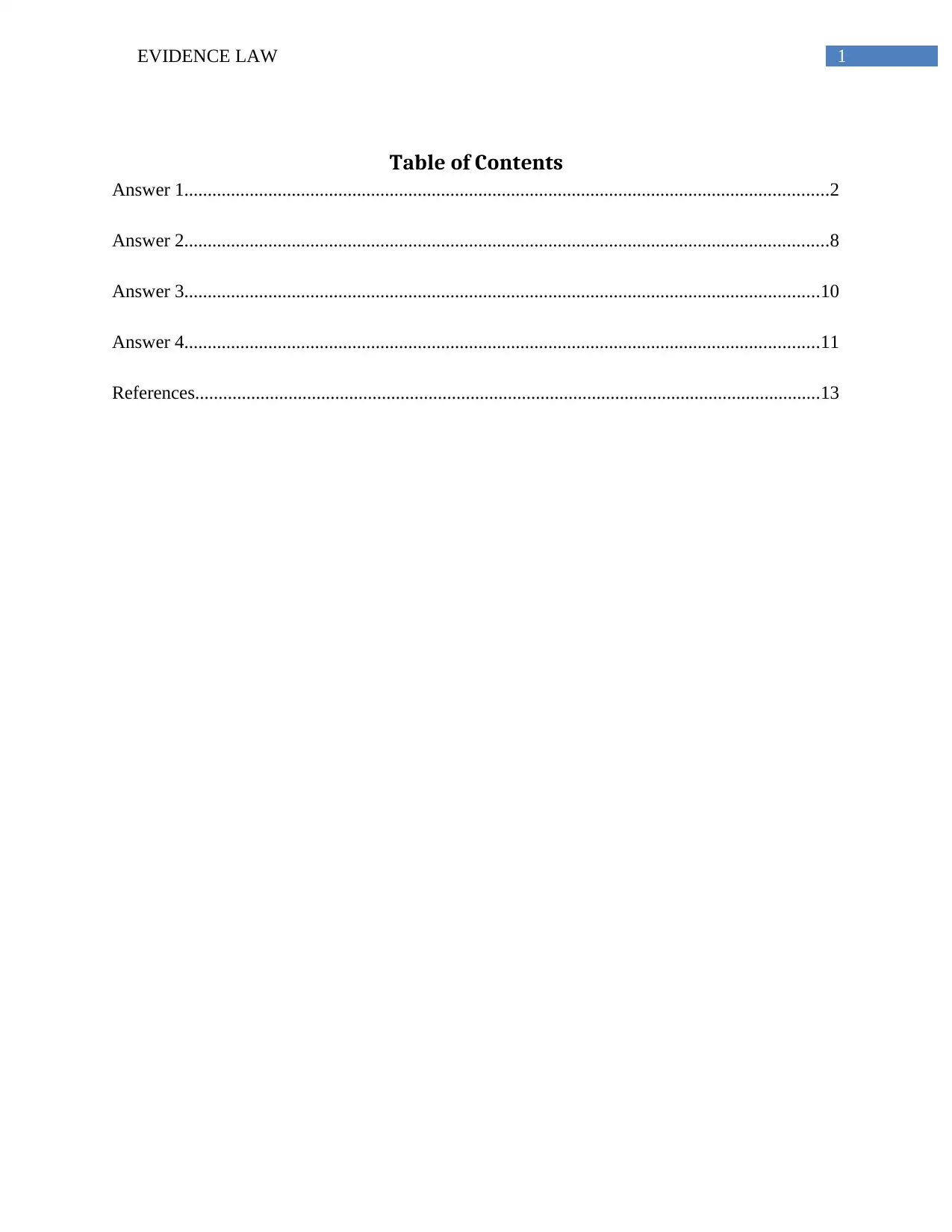
1EVIDENCE LAW
Table of Contents
Answer 1..........................................................................................................................................2
Answer 2..........................................................................................................................................8
Answer 3........................................................................................................................................10
Answer 4........................................................................................................................................11
References......................................................................................................................................13
Table of Contents
Answer 1..........................................................................................................................................2
Answer 2..........................................................................................................................................8
Answer 3........................................................................................................................................10
Answer 4........................................................................................................................................11
References......................................................................................................................................13
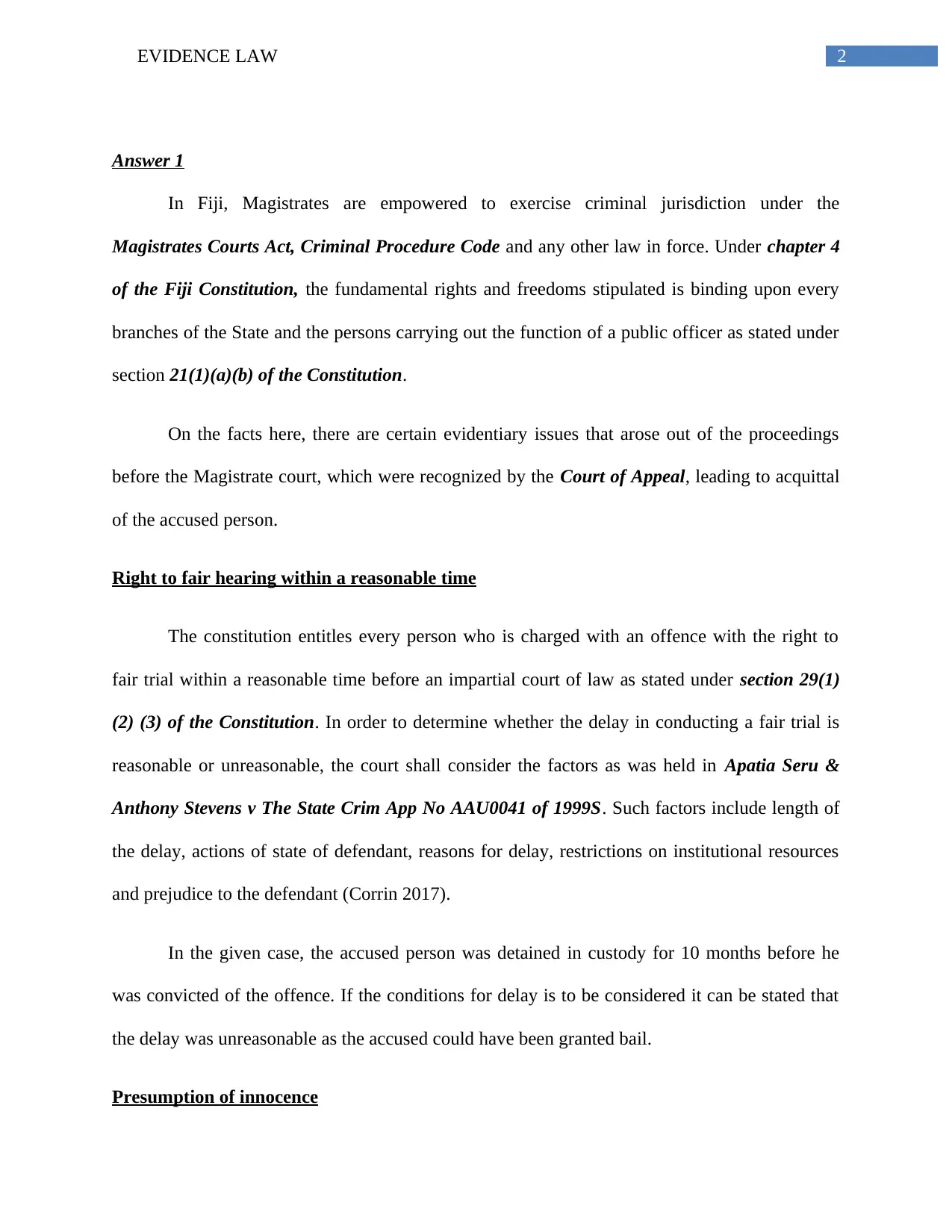
2EVIDENCE LAW
Answer 1
In Fiji, Magistrates are empowered to exercise criminal jurisdiction under the
Magistrates Courts Act, Criminal Procedure Code and any other law in force. Under chapter 4
of the Fiji Constitution, the fundamental rights and freedoms stipulated is binding upon every
branches of the State and the persons carrying out the function of a public officer as stated under
section 21(1)(a)(b) of the Constitution.
On the facts here, there are certain evidentiary issues that arose out of the proceedings
before the Magistrate court, which were recognized by the Court of Appeal, leading to acquittal
of the accused person.
Right to fair hearing within a reasonable time
The constitution entitles every person who is charged with an offence with the right to
fair trial within a reasonable time before an impartial court of law as stated under section 29(1)
(2) (3) of the Constitution. In order to determine whether the delay in conducting a fair trial is
reasonable or unreasonable, the court shall consider the factors as was held in Apatia Seru &
Anthony Stevens v The State Crim App No AAU0041 of 1999S. Such factors include length of
the delay, actions of state of defendant, reasons for delay, restrictions on institutional resources
and prejudice to the defendant (Corrin 2017).
In the given case, the accused person was detained in custody for 10 months before he
was convicted of the offence. If the conditions for delay is to be considered it can be stated that
the delay was unreasonable as the accused could have been granted bail.
Presumption of innocence
Answer 1
In Fiji, Magistrates are empowered to exercise criminal jurisdiction under the
Magistrates Courts Act, Criminal Procedure Code and any other law in force. Under chapter 4
of the Fiji Constitution, the fundamental rights and freedoms stipulated is binding upon every
branches of the State and the persons carrying out the function of a public officer as stated under
section 21(1)(a)(b) of the Constitution.
On the facts here, there are certain evidentiary issues that arose out of the proceedings
before the Magistrate court, which were recognized by the Court of Appeal, leading to acquittal
of the accused person.
Right to fair hearing within a reasonable time
The constitution entitles every person who is charged with an offence with the right to
fair trial within a reasonable time before an impartial court of law as stated under section 29(1)
(2) (3) of the Constitution. In order to determine whether the delay in conducting a fair trial is
reasonable or unreasonable, the court shall consider the factors as was held in Apatia Seru &
Anthony Stevens v The State Crim App No AAU0041 of 1999S. Such factors include length of
the delay, actions of state of defendant, reasons for delay, restrictions on institutional resources
and prejudice to the defendant (Corrin 2017).
In the given case, the accused person was detained in custody for 10 months before he
was convicted of the offence. If the conditions for delay is to be considered it can be stated that
the delay was unreasonable as the accused could have been granted bail.
Presumption of innocence
⊘ This is a preview!⊘
Do you want full access?
Subscribe today to unlock all pages.

Trusted by 1+ million students worldwide
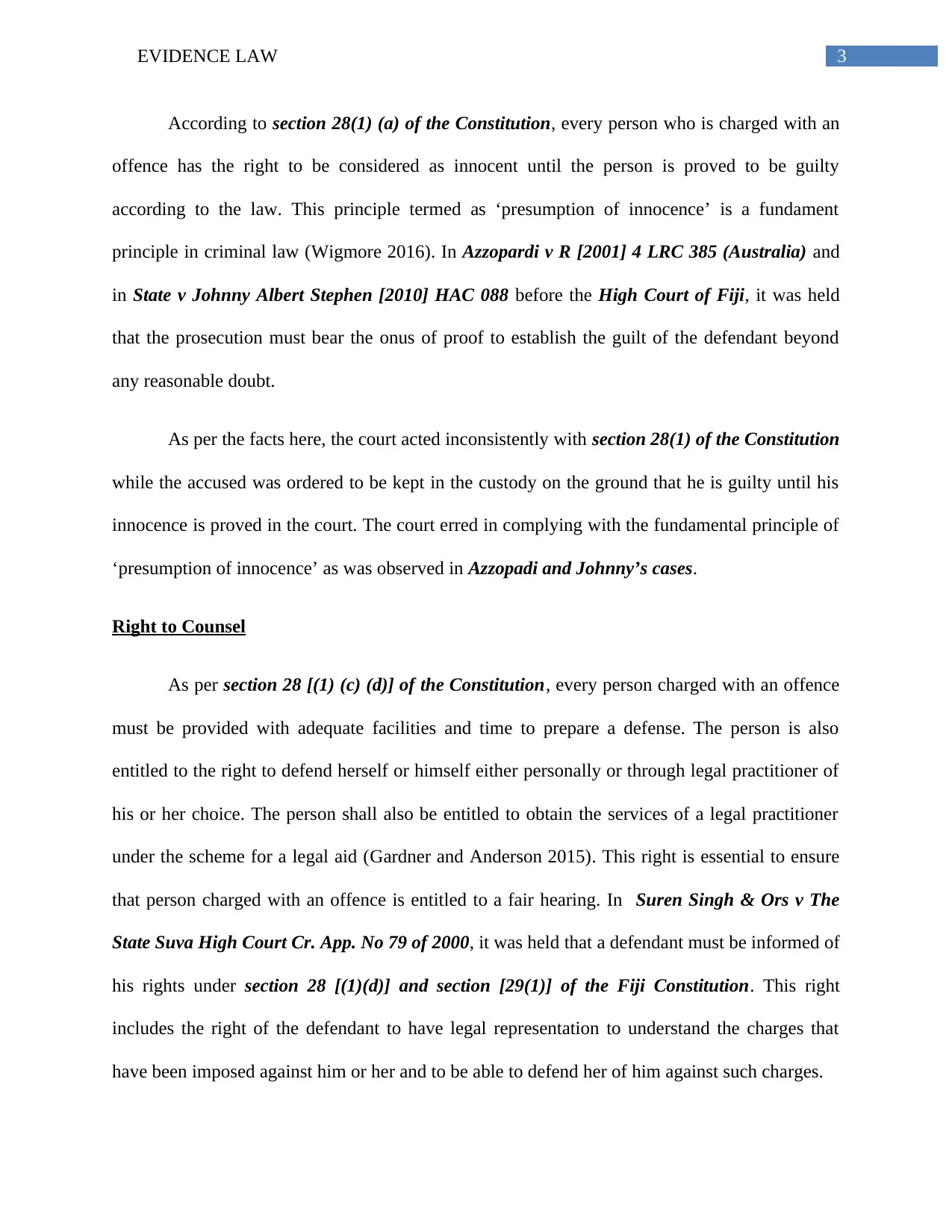
3EVIDENCE LAW
According to section 28(1) (a) of the Constitution, every person who is charged with an
offence has the right to be considered as innocent until the person is proved to be guilty
according to the law. This principle termed as ‘presumption of innocence’ is a fundament
principle in criminal law (Wigmore 2016). In Azzopardi v R [2001] 4 LRC 385 (Australia) and
in State v Johnny Albert Stephen [2010] HAC 088 before the High Court of Fiji, it was held
that the prosecution must bear the onus of proof to establish the guilt of the defendant beyond
any reasonable doubt.
As per the facts here, the court acted inconsistently with section 28(1) of the Constitution
while the accused was ordered to be kept in the custody on the ground that he is guilty until his
innocence is proved in the court. The court erred in complying with the fundamental principle of
‘presumption of innocence’ as was observed in Azzopadi and Johnny’s cases.
Right to Counsel
As per section 28 [(1) (c) (d)] of the Constitution, every person charged with an offence
must be provided with adequate facilities and time to prepare a defense. The person is also
entitled to the right to defend herself or himself either personally or through legal practitioner of
his or her choice. The person shall also be entitled to obtain the services of a legal practitioner
under the scheme for a legal aid (Gardner and Anderson 2015). This right is essential to ensure
that person charged with an offence is entitled to a fair hearing. In Suren Singh & Ors v The
State Suva High Court Cr. App. No 79 of 2000, it was held that a defendant must be informed of
his rights under section 28 [(1)(d)] and section [29(1)] of the Fiji Constitution. This right
includes the right of the defendant to have legal representation to understand the charges that
have been imposed against him or her and to be able to defend her of him against such charges.
According to section 28(1) (a) of the Constitution, every person who is charged with an
offence has the right to be considered as innocent until the person is proved to be guilty
according to the law. This principle termed as ‘presumption of innocence’ is a fundament
principle in criminal law (Wigmore 2016). In Azzopardi v R [2001] 4 LRC 385 (Australia) and
in State v Johnny Albert Stephen [2010] HAC 088 before the High Court of Fiji, it was held
that the prosecution must bear the onus of proof to establish the guilt of the defendant beyond
any reasonable doubt.
As per the facts here, the court acted inconsistently with section 28(1) of the Constitution
while the accused was ordered to be kept in the custody on the ground that he is guilty until his
innocence is proved in the court. The court erred in complying with the fundamental principle of
‘presumption of innocence’ as was observed in Azzopadi and Johnny’s cases.
Right to Counsel
As per section 28 [(1) (c) (d)] of the Constitution, every person charged with an offence
must be provided with adequate facilities and time to prepare a defense. The person is also
entitled to the right to defend herself or himself either personally or through legal practitioner of
his or her choice. The person shall also be entitled to obtain the services of a legal practitioner
under the scheme for a legal aid (Gardner and Anderson 2015). This right is essential to ensure
that person charged with an offence is entitled to a fair hearing. In Suren Singh & Ors v The
State Suva High Court Cr. App. No 79 of 2000, it was held that a defendant must be informed of
his rights under section 28 [(1)(d)] and section [29(1)] of the Fiji Constitution. This right
includes the right of the defendant to have legal representation to understand the charges that
have been imposed against him or her and to be able to defend her of him against such charges.
Paraphrase This Document
Need a fresh take? Get an instant paraphrase of this document with our AI Paraphraser
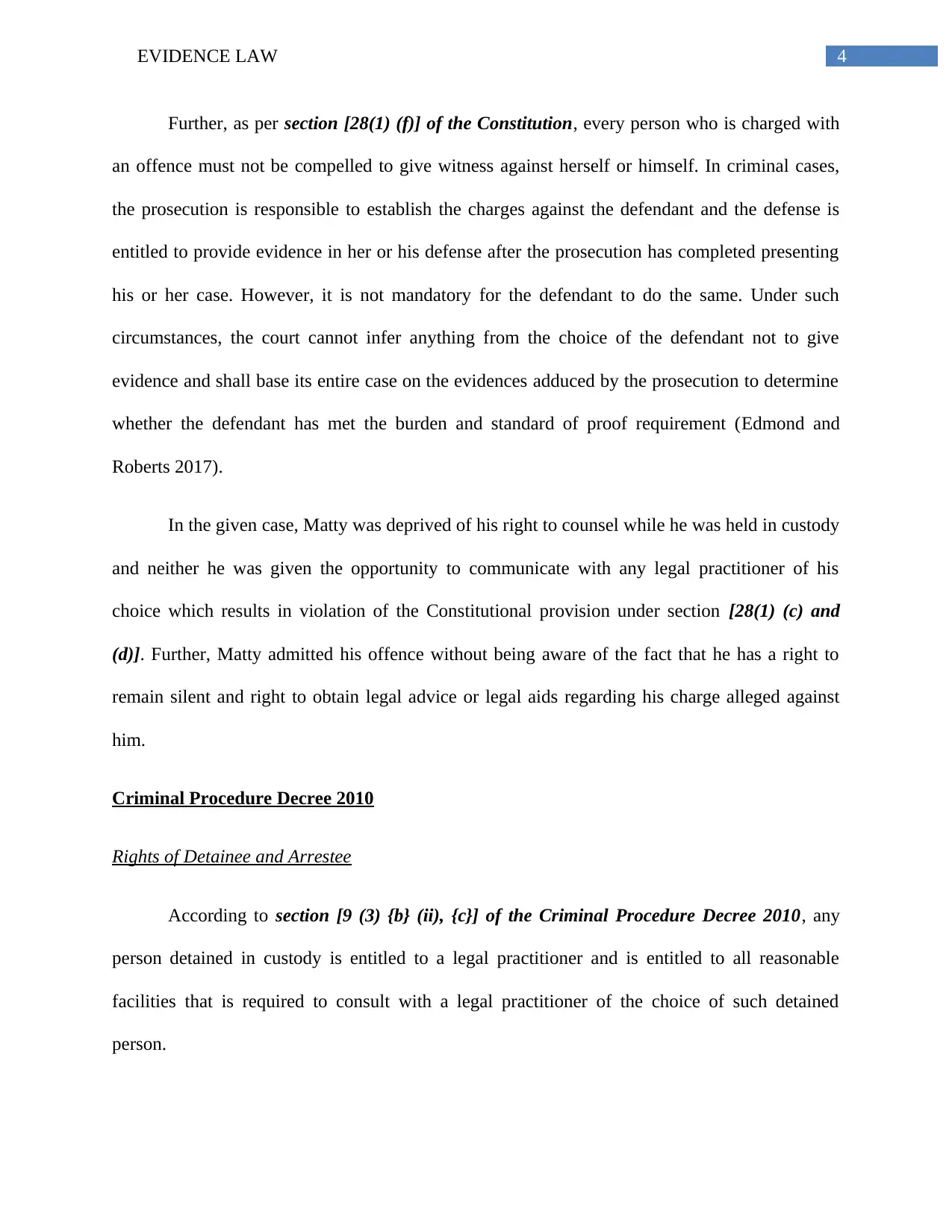
4EVIDENCE LAW
Further, as per section [28(1) (f)] of the Constitution, every person who is charged with
an offence must not be compelled to give witness against herself or himself. In criminal cases,
the prosecution is responsible to establish the charges against the defendant and the defense is
entitled to provide evidence in her or his defense after the prosecution has completed presenting
his or her case. However, it is not mandatory for the defendant to do the same. Under such
circumstances, the court cannot infer anything from the choice of the defendant not to give
evidence and shall base its entire case on the evidences adduced by the prosecution to determine
whether the defendant has met the burden and standard of proof requirement (Edmond and
Roberts 2017).
In the given case, Matty was deprived of his right to counsel while he was held in custody
and neither he was given the opportunity to communicate with any legal practitioner of his
choice which results in violation of the Constitutional provision under section [28(1) (c) and
(d)]. Further, Matty admitted his offence without being aware of the fact that he has a right to
remain silent and right to obtain legal advice or legal aids regarding his charge alleged against
him.
Criminal Procedure Decree 2010
Rights of Detainee and Arrestee
According to section [9 (3) {b} (ii), {c}] of the Criminal Procedure Decree 2010, any
person detained in custody is entitled to a legal practitioner and is entitled to all reasonable
facilities that is required to consult with a legal practitioner of the choice of such detained
person.
Further, as per section [28(1) (f)] of the Constitution, every person who is charged with
an offence must not be compelled to give witness against herself or himself. In criminal cases,
the prosecution is responsible to establish the charges against the defendant and the defense is
entitled to provide evidence in her or his defense after the prosecution has completed presenting
his or her case. However, it is not mandatory for the defendant to do the same. Under such
circumstances, the court cannot infer anything from the choice of the defendant not to give
evidence and shall base its entire case on the evidences adduced by the prosecution to determine
whether the defendant has met the burden and standard of proof requirement (Edmond and
Roberts 2017).
In the given case, Matty was deprived of his right to counsel while he was held in custody
and neither he was given the opportunity to communicate with any legal practitioner of his
choice which results in violation of the Constitutional provision under section [28(1) (c) and
(d)]. Further, Matty admitted his offence without being aware of the fact that he has a right to
remain silent and right to obtain legal advice or legal aids regarding his charge alleged against
him.
Criminal Procedure Decree 2010
Rights of Detainee and Arrestee
According to section [9 (3) {b} (ii), {c}] of the Criminal Procedure Decree 2010, any
person detained in custody is entitled to a legal practitioner and is entitled to all reasonable
facilities that is required to consult with a legal practitioner of the choice of such detained
person.
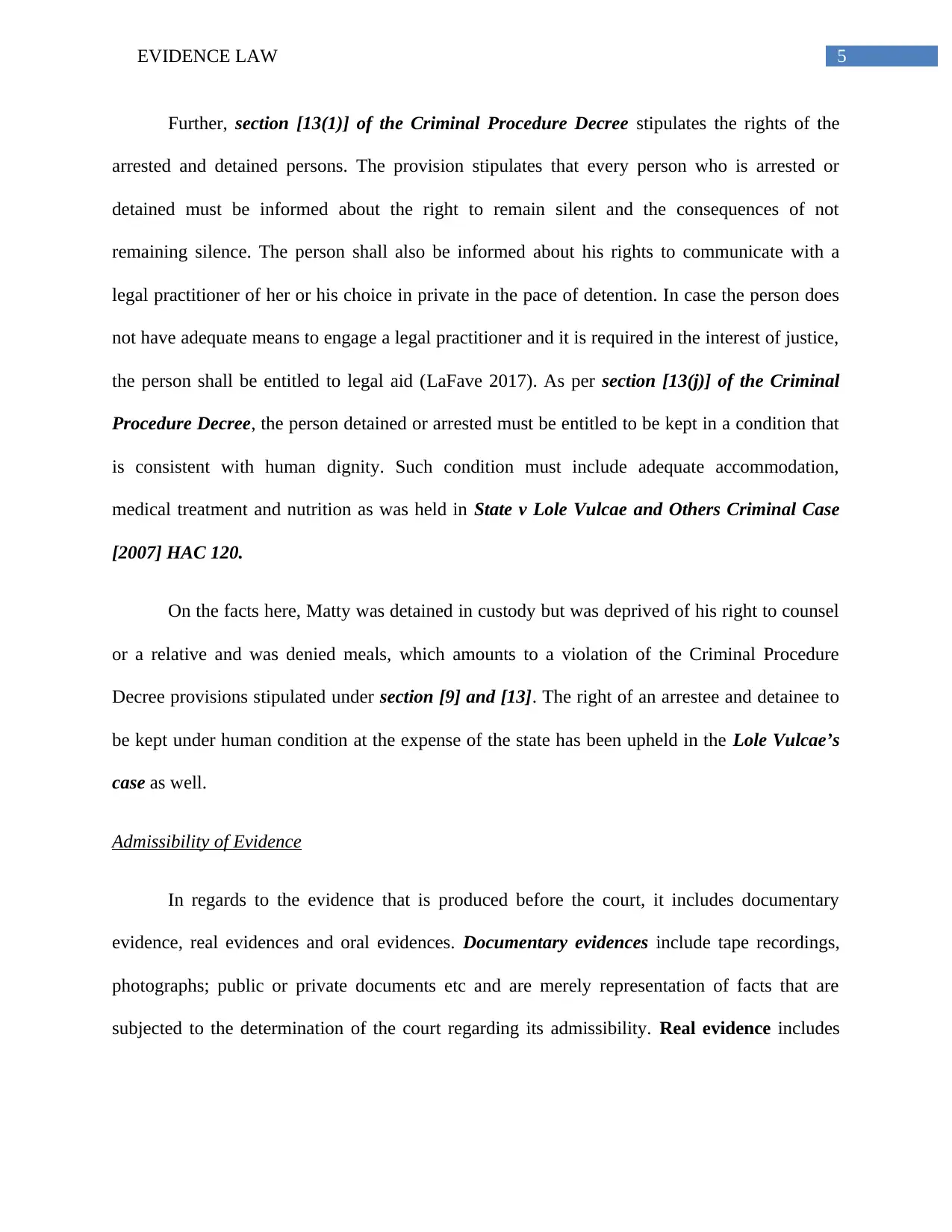
5EVIDENCE LAW
Further, section [13(1)] of the Criminal Procedure Decree stipulates the rights of the
arrested and detained persons. The provision stipulates that every person who is arrested or
detained must be informed about the right to remain silent and the consequences of not
remaining silence. The person shall also be informed about his rights to communicate with a
legal practitioner of her or his choice in private in the pace of detention. In case the person does
not have adequate means to engage a legal practitioner and it is required in the interest of justice,
the person shall be entitled to legal aid (LaFave 2017). As per section [13(j)] of the Criminal
Procedure Decree, the person detained or arrested must be entitled to be kept in a condition that
is consistent with human dignity. Such condition must include adequate accommodation,
medical treatment and nutrition as was held in State v Lole Vulcae and Others Criminal Case
[2007] HAC 120.
On the facts here, Matty was detained in custody but was deprived of his right to counsel
or a relative and was denied meals, which amounts to a violation of the Criminal Procedure
Decree provisions stipulated under section [9] and [13]. The right of an arrestee and detainee to
be kept under human condition at the expense of the state has been upheld in the Lole Vulcae’s
case as well.
Admissibility of Evidence
In regards to the evidence that is produced before the court, it includes documentary
evidence, real evidences and oral evidences. Documentary evidences include tape recordings,
photographs; public or private documents etc and are merely representation of facts that are
subjected to the determination of the court regarding its admissibility. Real evidence includes
Further, section [13(1)] of the Criminal Procedure Decree stipulates the rights of the
arrested and detained persons. The provision stipulates that every person who is arrested or
detained must be informed about the right to remain silent and the consequences of not
remaining silence. The person shall also be informed about his rights to communicate with a
legal practitioner of her or his choice in private in the pace of detention. In case the person does
not have adequate means to engage a legal practitioner and it is required in the interest of justice,
the person shall be entitled to legal aid (LaFave 2017). As per section [13(j)] of the Criminal
Procedure Decree, the person detained or arrested must be entitled to be kept in a condition that
is consistent with human dignity. Such condition must include adequate accommodation,
medical treatment and nutrition as was held in State v Lole Vulcae and Others Criminal Case
[2007] HAC 120.
On the facts here, Matty was detained in custody but was deprived of his right to counsel
or a relative and was denied meals, which amounts to a violation of the Criminal Procedure
Decree provisions stipulated under section [9] and [13]. The right of an arrestee and detainee to
be kept under human condition at the expense of the state has been upheld in the Lole Vulcae’s
case as well.
Admissibility of Evidence
In regards to the evidence that is produced before the court, it includes documentary
evidence, real evidences and oral evidences. Documentary evidences include tape recordings,
photographs; public or private documents etc and are merely representation of facts that are
subjected to the determination of the court regarding its admissibility. Real evidence includes
⊘ This is a preview!⊘
Do you want full access?
Subscribe today to unlock all pages.

Trusted by 1+ million students worldwide
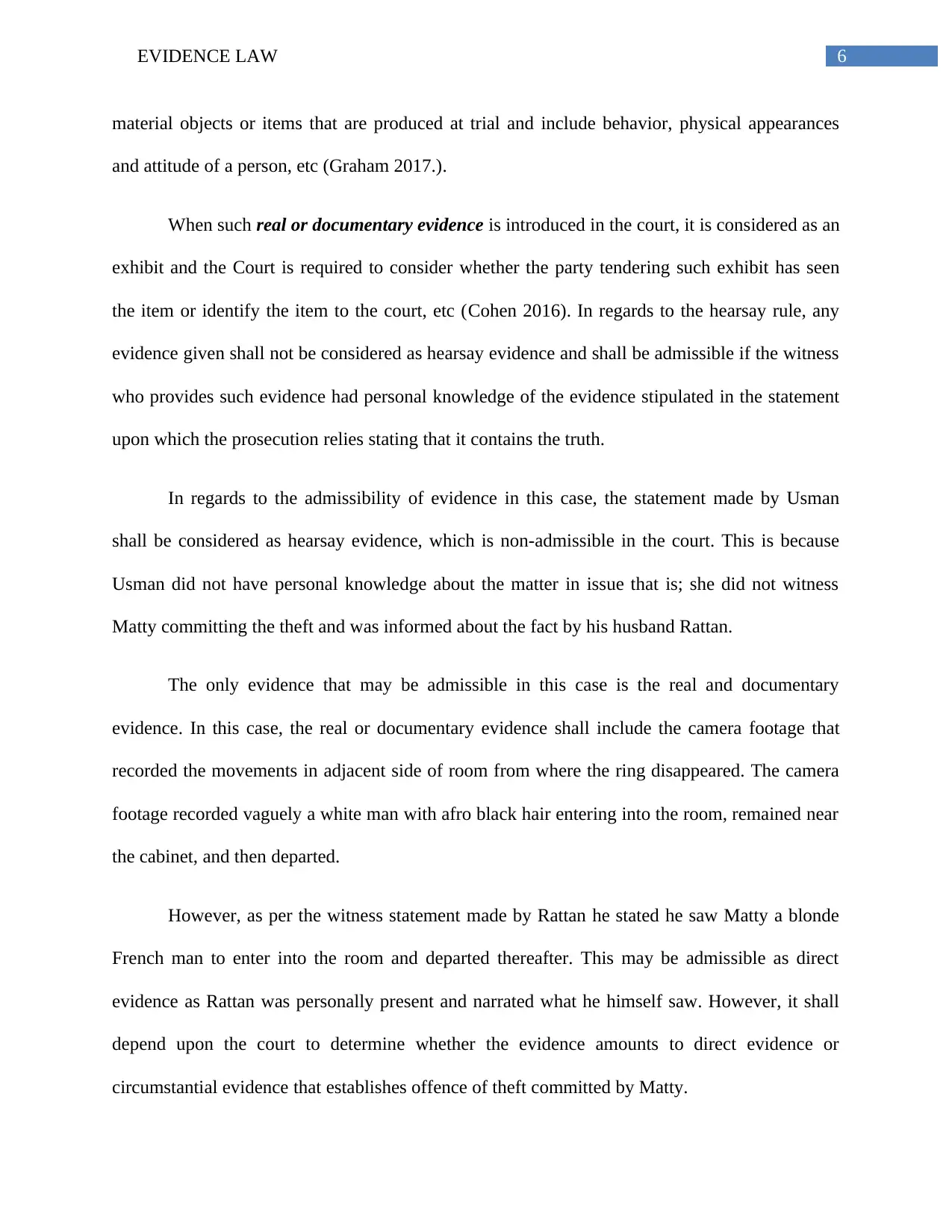
6EVIDENCE LAW
material objects or items that are produced at trial and include behavior, physical appearances
and attitude of a person, etc (Graham 2017.).
When such real or documentary evidence is introduced in the court, it is considered as an
exhibit and the Court is required to consider whether the party tendering such exhibit has seen
the item or identify the item to the court, etc (Cohen 2016). In regards to the hearsay rule, any
evidence given shall not be considered as hearsay evidence and shall be admissible if the witness
who provides such evidence had personal knowledge of the evidence stipulated in the statement
upon which the prosecution relies stating that it contains the truth.
In regards to the admissibility of evidence in this case, the statement made by Usman
shall be considered as hearsay evidence, which is non-admissible in the court. This is because
Usman did not have personal knowledge about the matter in issue that is; she did not witness
Matty committing the theft and was informed about the fact by his husband Rattan.
The only evidence that may be admissible in this case is the real and documentary
evidence. In this case, the real or documentary evidence shall include the camera footage that
recorded the movements in adjacent side of room from where the ring disappeared. The camera
footage recorded vaguely a white man with afro black hair entering into the room, remained near
the cabinet, and then departed.
However, as per the witness statement made by Rattan he stated he saw Matty a blonde
French man to enter into the room and departed thereafter. This may be admissible as direct
evidence as Rattan was personally present and narrated what he himself saw. However, it shall
depend upon the court to determine whether the evidence amounts to direct evidence or
circumstantial evidence that establishes offence of theft committed by Matty.
material objects or items that are produced at trial and include behavior, physical appearances
and attitude of a person, etc (Graham 2017.).
When such real or documentary evidence is introduced in the court, it is considered as an
exhibit and the Court is required to consider whether the party tendering such exhibit has seen
the item or identify the item to the court, etc (Cohen 2016). In regards to the hearsay rule, any
evidence given shall not be considered as hearsay evidence and shall be admissible if the witness
who provides such evidence had personal knowledge of the evidence stipulated in the statement
upon which the prosecution relies stating that it contains the truth.
In regards to the admissibility of evidence in this case, the statement made by Usman
shall be considered as hearsay evidence, which is non-admissible in the court. This is because
Usman did not have personal knowledge about the matter in issue that is; she did not witness
Matty committing the theft and was informed about the fact by his husband Rattan.
The only evidence that may be admissible in this case is the real and documentary
evidence. In this case, the real or documentary evidence shall include the camera footage that
recorded the movements in adjacent side of room from where the ring disappeared. The camera
footage recorded vaguely a white man with afro black hair entering into the room, remained near
the cabinet, and then departed.
However, as per the witness statement made by Rattan he stated he saw Matty a blonde
French man to enter into the room and departed thereafter. This may be admissible as direct
evidence as Rattan was personally present and narrated what he himself saw. However, it shall
depend upon the court to determine whether the evidence amounts to direct evidence or
circumstantial evidence that establishes offence of theft committed by Matty.
Paraphrase This Document
Need a fresh take? Get an instant paraphrase of this document with our AI Paraphraser
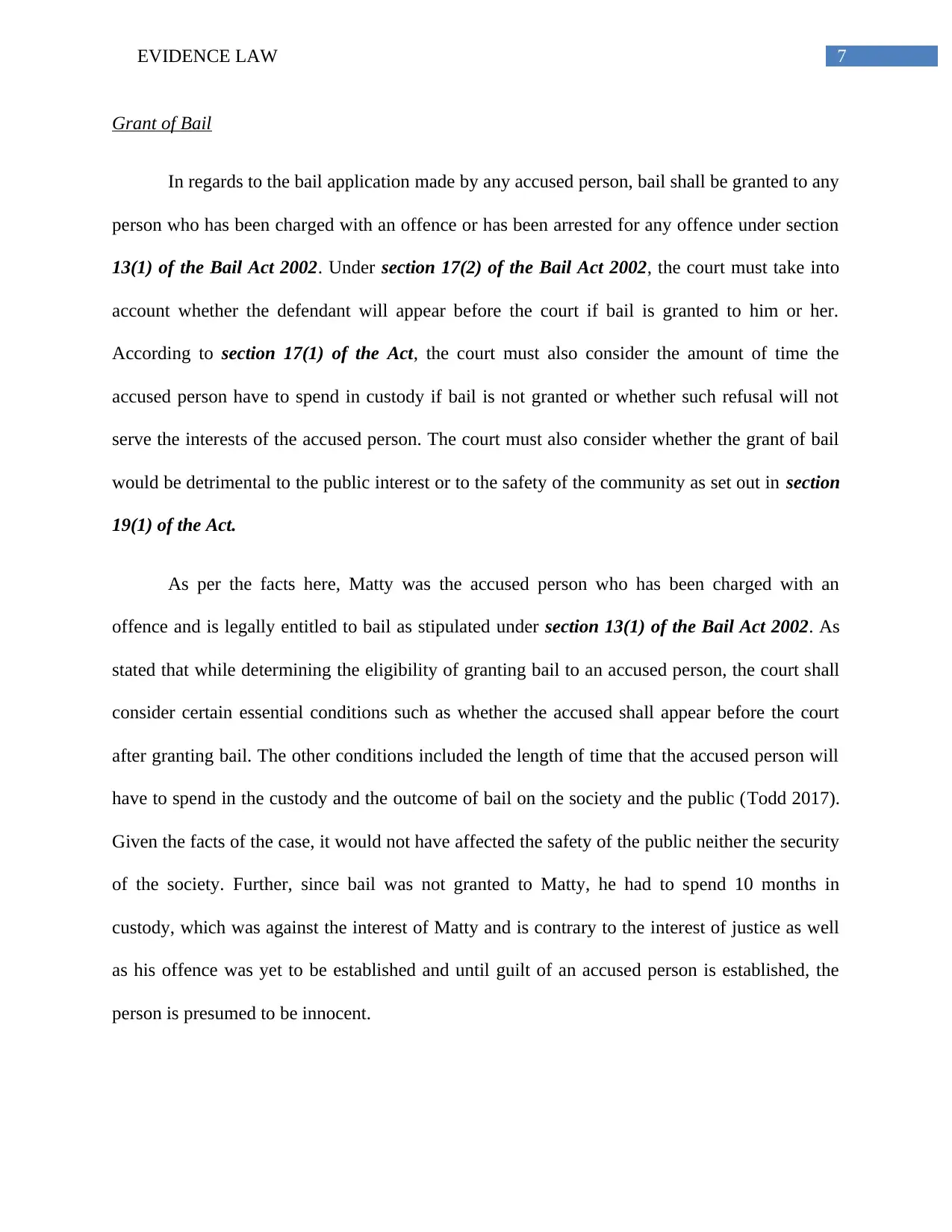
7EVIDENCE LAW
Grant of Bail
In regards to the bail application made by any accused person, bail shall be granted to any
person who has been charged with an offence or has been arrested for any offence under section
13(1) of the Bail Act 2002. Under section 17(2) of the Bail Act 2002, the court must take into
account whether the defendant will appear before the court if bail is granted to him or her.
According to section 17(1) of the Act, the court must also consider the amount of time the
accused person have to spend in custody if bail is not granted or whether such refusal will not
serve the interests of the accused person. The court must also consider whether the grant of bail
would be detrimental to the public interest or to the safety of the community as set out in section
19(1) of the Act.
As per the facts here, Matty was the accused person who has been charged with an
offence and is legally entitled to bail as stipulated under section 13(1) of the Bail Act 2002. As
stated that while determining the eligibility of granting bail to an accused person, the court shall
consider certain essential conditions such as whether the accused shall appear before the court
after granting bail. The other conditions included the length of time that the accused person will
have to spend in the custody and the outcome of bail on the society and the public (Todd 2017).
Given the facts of the case, it would not have affected the safety of the public neither the security
of the society. Further, since bail was not granted to Matty, he had to spend 10 months in
custody, which was against the interest of Matty and is contrary to the interest of justice as well
as his offence was yet to be established and until guilt of an accused person is established, the
person is presumed to be innocent.
Grant of Bail
In regards to the bail application made by any accused person, bail shall be granted to any
person who has been charged with an offence or has been arrested for any offence under section
13(1) of the Bail Act 2002. Under section 17(2) of the Bail Act 2002, the court must take into
account whether the defendant will appear before the court if bail is granted to him or her.
According to section 17(1) of the Act, the court must also consider the amount of time the
accused person have to spend in custody if bail is not granted or whether such refusal will not
serve the interests of the accused person. The court must also consider whether the grant of bail
would be detrimental to the public interest or to the safety of the community as set out in section
19(1) of the Act.
As per the facts here, Matty was the accused person who has been charged with an
offence and is legally entitled to bail as stipulated under section 13(1) of the Bail Act 2002. As
stated that while determining the eligibility of granting bail to an accused person, the court shall
consider certain essential conditions such as whether the accused shall appear before the court
after granting bail. The other conditions included the length of time that the accused person will
have to spend in the custody and the outcome of bail on the society and the public (Todd 2017).
Given the facts of the case, it would not have affected the safety of the public neither the security
of the society. Further, since bail was not granted to Matty, he had to spend 10 months in
custody, which was against the interest of Matty and is contrary to the interest of justice as well
as his offence was yet to be established and until guilt of an accused person is established, the
person is presumed to be innocent.
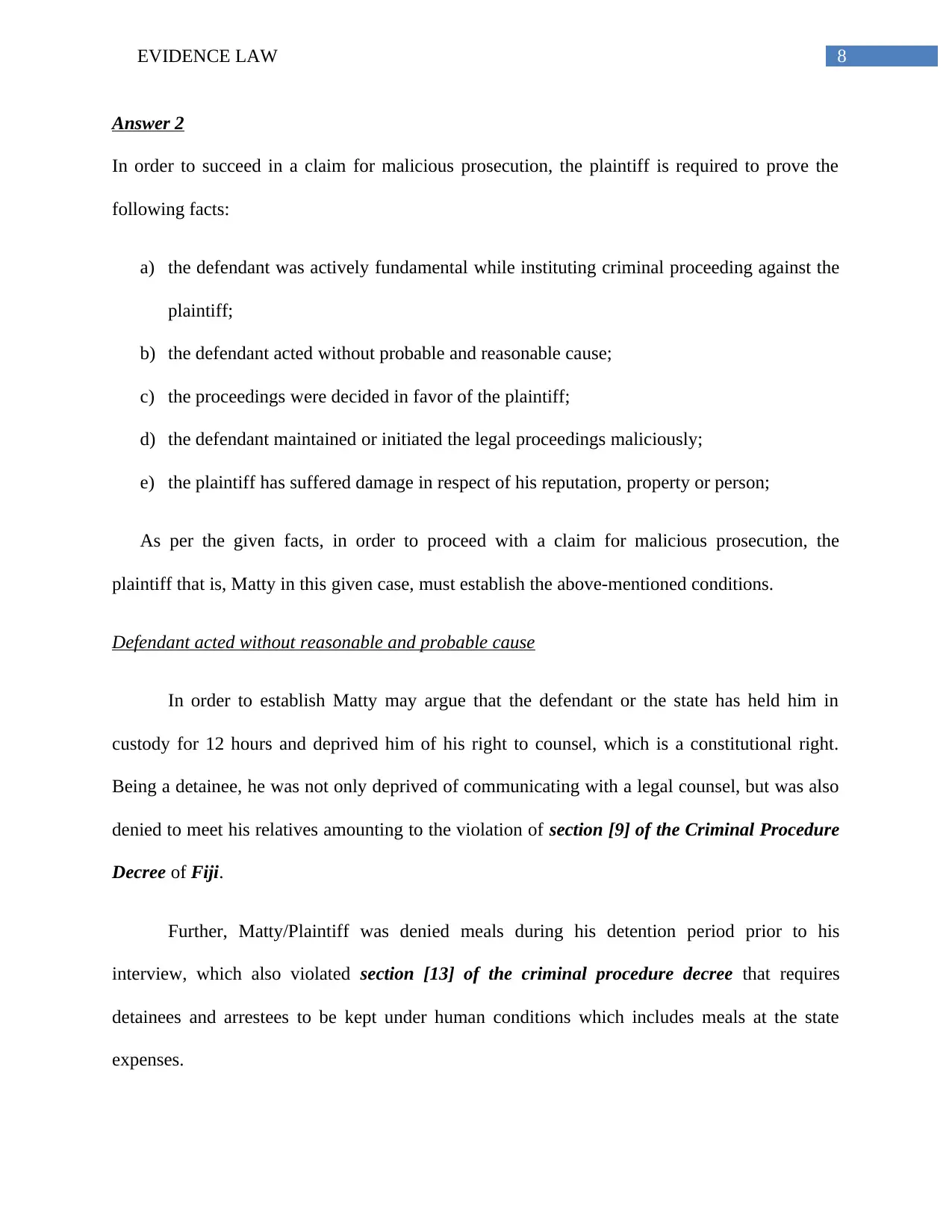
8EVIDENCE LAW
Answer 2
In order to succeed in a claim for malicious prosecution, the plaintiff is required to prove the
following facts:
a) the defendant was actively fundamental while instituting criminal proceeding against the
plaintiff;
b) the defendant acted without probable and reasonable cause;
c) the proceedings were decided in favor of the plaintiff;
d) the defendant maintained or initiated the legal proceedings maliciously;
e) the plaintiff has suffered damage in respect of his reputation, property or person;
As per the given facts, in order to proceed with a claim for malicious prosecution, the
plaintiff that is, Matty in this given case, must establish the above-mentioned conditions.
Defendant acted without reasonable and probable cause
In order to establish Matty may argue that the defendant or the state has held him in
custody for 12 hours and deprived him of his right to counsel, which is a constitutional right.
Being a detainee, he was not only deprived of communicating with a legal counsel, but was also
denied to meet his relatives amounting to the violation of section [9] of the Criminal Procedure
Decree of Fiji.
Further, Matty/Plaintiff was denied meals during his detention period prior to his
interview, which also violated section [13] of the criminal procedure decree that requires
detainees and arrestees to be kept under human conditions which includes meals at the state
expenses.
Answer 2
In order to succeed in a claim for malicious prosecution, the plaintiff is required to prove the
following facts:
a) the defendant was actively fundamental while instituting criminal proceeding against the
plaintiff;
b) the defendant acted without probable and reasonable cause;
c) the proceedings were decided in favor of the plaintiff;
d) the defendant maintained or initiated the legal proceedings maliciously;
e) the plaintiff has suffered damage in respect of his reputation, property or person;
As per the given facts, in order to proceed with a claim for malicious prosecution, the
plaintiff that is, Matty in this given case, must establish the above-mentioned conditions.
Defendant acted without reasonable and probable cause
In order to establish Matty may argue that the defendant or the state has held him in
custody for 12 hours and deprived him of his right to counsel, which is a constitutional right.
Being a detainee, he was not only deprived of communicating with a legal counsel, but was also
denied to meet his relatives amounting to the violation of section [9] of the Criminal Procedure
Decree of Fiji.
Further, Matty/Plaintiff was denied meals during his detention period prior to his
interview, which also violated section [13] of the criminal procedure decree that requires
detainees and arrestees to be kept under human conditions which includes meals at the state
expenses.
⊘ This is a preview!⊘
Do you want full access?
Subscribe today to unlock all pages.

Trusted by 1+ million students worldwide
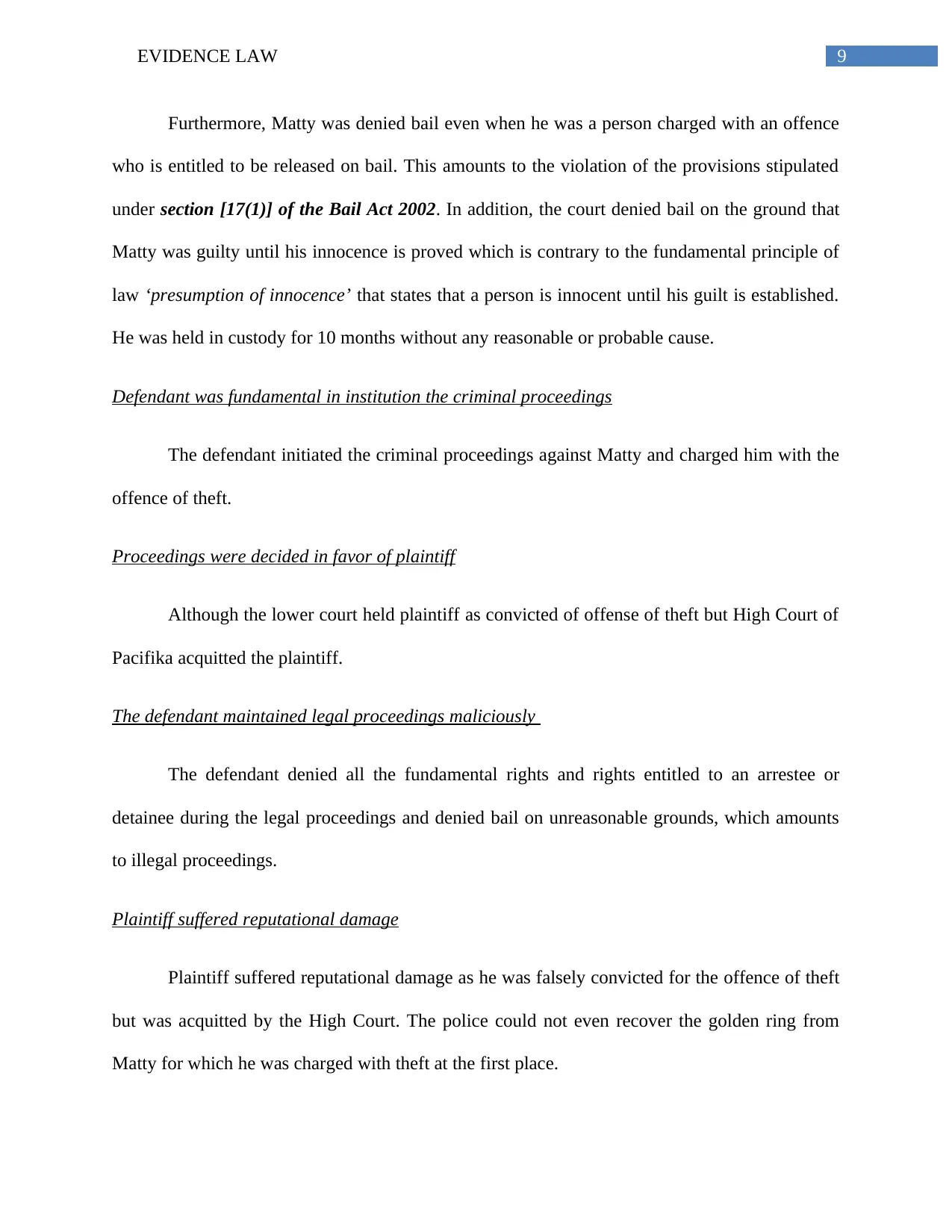
9EVIDENCE LAW
Furthermore, Matty was denied bail even when he was a person charged with an offence
who is entitled to be released on bail. This amounts to the violation of the provisions stipulated
under section [17(1)] of the Bail Act 2002. In addition, the court denied bail on the ground that
Matty was guilty until his innocence is proved which is contrary to the fundamental principle of
law ‘presumption of innocence’ that states that a person is innocent until his guilt is established.
He was held in custody for 10 months without any reasonable or probable cause.
Defendant was fundamental in institution the criminal proceedings
The defendant initiated the criminal proceedings against Matty and charged him with the
offence of theft.
Proceedings were decided in favor of plaintiff
Although the lower court held plaintiff as convicted of offense of theft but High Court of
Pacifika acquitted the plaintiff.
The defendant maintained legal proceedings maliciously
The defendant denied all the fundamental rights and rights entitled to an arrestee or
detainee during the legal proceedings and denied bail on unreasonable grounds, which amounts
to illegal proceedings.
Plaintiff suffered reputational damage
Plaintiff suffered reputational damage as he was falsely convicted for the offence of theft
but was acquitted by the High Court. The police could not even recover the golden ring from
Matty for which he was charged with theft at the first place.
Furthermore, Matty was denied bail even when he was a person charged with an offence
who is entitled to be released on bail. This amounts to the violation of the provisions stipulated
under section [17(1)] of the Bail Act 2002. In addition, the court denied bail on the ground that
Matty was guilty until his innocence is proved which is contrary to the fundamental principle of
law ‘presumption of innocence’ that states that a person is innocent until his guilt is established.
He was held in custody for 10 months without any reasonable or probable cause.
Defendant was fundamental in institution the criminal proceedings
The defendant initiated the criminal proceedings against Matty and charged him with the
offence of theft.
Proceedings were decided in favor of plaintiff
Although the lower court held plaintiff as convicted of offense of theft but High Court of
Pacifika acquitted the plaintiff.
The defendant maintained legal proceedings maliciously
The defendant denied all the fundamental rights and rights entitled to an arrestee or
detainee during the legal proceedings and denied bail on unreasonable grounds, which amounts
to illegal proceedings.
Plaintiff suffered reputational damage
Plaintiff suffered reputational damage as he was falsely convicted for the offence of theft
but was acquitted by the High Court. The police could not even recover the golden ring from
Matty for which he was charged with theft at the first place.
Paraphrase This Document
Need a fresh take? Get an instant paraphrase of this document with our AI Paraphraser

10EVIDENCE LAW
The real and documentary evidence included the camera footage, which vaguely showed
a afro-black haired person entering into the room whereas in reality, Matty was a French man
with blonde hair. Further, the witness statement provided by Rattan could be false as he recently
had a row over cutting of guava tree branch that was hanging over Frances’s compound.
Furthermore, the witness evidence provided by Usman could not be admissible being hearsay
evidence and that she was not present to witness the matter in issue but has only heard from her
husband.
The legal as well as evidentiary burden and standard of proof is upon the prosecution to
establish that Matty has committed the offense of theft beyond any reasonable doubt. The
prosecution failed to establish his guilt as the evidences adduced could not establish the charge
against Matty.
Answer 3
The advocate for accused persons or persons charged with an offence is obligated to
inform the person about the nature of the offence and the consequence of such offense, if it is
proved. The attorney shall provide the accused person with all necessary legal advice that might
assist him in obtaining the legal proceedings in his or her favor (Myers 2017).
The objective of cross-examination is to examine the evidence provided by the witness
whether such witness is a prosecution witness or a witness for the defendant (Spencer 2014).
While the prosecution cross-examines a witness of the defense even if it is the accused person
itself, the attorney for the defense must ensure that the defendant do not assert any statement that
may be used against him or her to establish the charge of offence.
The real and documentary evidence included the camera footage, which vaguely showed
a afro-black haired person entering into the room whereas in reality, Matty was a French man
with blonde hair. Further, the witness statement provided by Rattan could be false as he recently
had a row over cutting of guava tree branch that was hanging over Frances’s compound.
Furthermore, the witness evidence provided by Usman could not be admissible being hearsay
evidence and that she was not present to witness the matter in issue but has only heard from her
husband.
The legal as well as evidentiary burden and standard of proof is upon the prosecution to
establish that Matty has committed the offense of theft beyond any reasonable doubt. The
prosecution failed to establish his guilt as the evidences adduced could not establish the charge
against Matty.
Answer 3
The advocate for accused persons or persons charged with an offence is obligated to
inform the person about the nature of the offence and the consequence of such offense, if it is
proved. The attorney shall provide the accused person with all necessary legal advice that might
assist him in obtaining the legal proceedings in his or her favor (Myers 2017).
The objective of cross-examination is to examine the evidence provided by the witness
whether such witness is a prosecution witness or a witness for the defendant (Spencer 2014).
While the prosecution cross-examines a witness of the defense even if it is the accused person
itself, the attorney for the defense must ensure that the defendant do not assert any statement that
may be used against him or her to establish the charge of offence.

11EVIDENCE LAW
The defense attorney shall ensure that the witness or the accused person is not harassed or
bullied by the prosecution counsel. The defense attorney must ensure that the attorney for the
prosecution does not compel or ask questions that are irrelevant to the case and shall cause
reputational damage to the accused person or the witness. It is essential that the cross-
examination take place with respect to the relevant case of the defendant (Lau 2016).
As per the facts here, Sione being the attorney of Matty must provide sufficient
information about the charge of offence for which he had been held in custody. She must inform
him about is right to remain silent and the consequences of remaining silent. Sione is obligated to
inform him about the procedure of cross-examination and the statements to be made during the
same, which might prevent him from exposing his weakness and be used against him in the
court. Sione must also ensure that the prosecution is not bullying or harassing Matty and that the
questions asked are related to the relevant case of the defendant.
Answer 4
According to section 135 CPC, the court may summon any person as a witness or
examine any person in attendance during any stage of trial. The Court may remand a witness if
such witness refuses to answer any question or refuses to take an oath (Posner 2015). Further, if
the examination of such witness is essential for administering justice and that the attendance of
such witness can be obtained without unreasonable delay, inconvenience and expense, a
commission may be issued to the Magistrate of local jurisdiction to take the evidence of such
witness under section 139 CPC.
If the court is satisfied that the evidence provided by the complainant has not been
supported by any other witness but is sufficient enough to establish the offence with which the
The defense attorney shall ensure that the witness or the accused person is not harassed or
bullied by the prosecution counsel. The defense attorney must ensure that the attorney for the
prosecution does not compel or ask questions that are irrelevant to the case and shall cause
reputational damage to the accused person or the witness. It is essential that the cross-
examination take place with respect to the relevant case of the defendant (Lau 2016).
As per the facts here, Sione being the attorney of Matty must provide sufficient
information about the charge of offence for which he had been held in custody. She must inform
him about is right to remain silent and the consequences of remaining silent. Sione is obligated to
inform him about the procedure of cross-examination and the statements to be made during the
same, which might prevent him from exposing his weakness and be used against him in the
court. Sione must also ensure that the prosecution is not bullying or harassing Matty and that the
questions asked are related to the relevant case of the defendant.
Answer 4
According to section 135 CPC, the court may summon any person as a witness or
examine any person in attendance during any stage of trial. The Court may remand a witness if
such witness refuses to answer any question or refuses to take an oath (Posner 2015). Further, if
the examination of such witness is essential for administering justice and that the attendance of
such witness can be obtained without unreasonable delay, inconvenience and expense, a
commission may be issued to the Magistrate of local jurisdiction to take the evidence of such
witness under section 139 CPC.
If the court is satisfied that the evidence provided by the complainant has not been
supported by any other witness but is sufficient enough to establish the offence with which the
⊘ This is a preview!⊘
Do you want full access?
Subscribe today to unlock all pages.

Trusted by 1+ million students worldwide
1 out of 16
Related Documents
Your All-in-One AI-Powered Toolkit for Academic Success.
+13062052269
info@desklib.com
Available 24*7 on WhatsApp / Email
![[object Object]](/_next/static/media/star-bottom.7253800d.svg)
Unlock your academic potential
Copyright © 2020–2026 A2Z Services. All Rights Reserved. Developed and managed by ZUCOL.





